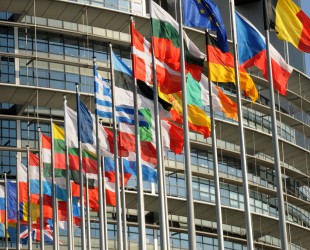Key Issue:NGOs 101: The Basics on NGOs, Delegitimization, and the Role of Europe
What are NGOs? How are they funded? What is their role in BDS and other campaigns of delegitimization?
Disproportionate Focus on the Arab-Israeli Conflict
The scale and nature of foreign government funding for NGOs involved in the Arab-Israeli Conflict is unique, especially compared to other conflict zones around the world. For instance, NGO Monitor research shows that during the years 2007-2010 (the most recent consolidated information available) a major EU funding instrument – European Instrument for Democracy and Human Rights (EIDHR) – allocated 57% of its country-based support scheme budget intended for the Middle East to either Israel or the PA, while no funding was allocated for Syria, Iraq, Saudi Arabia and other much needed areas.
European governments have not provided any justification for their disproportionate funding for NGO projects in Israel, the West Bank, and Gaza, as well as related political campaigns in Europe and the United Nations. The impact of this funding is magnified by the use of this money to lobby governments in Europe and North America, and to oppose legislation and influence other domestic issues in Israel.
If Europe sought to similarly influence American policies, politics, and society, it would involve annual transfers of billions of dollars to American NGOs focusing on the most controversial political issues, such as abortion, gun control, race, and immigration. Even a small-scale campaign on such issues funded by foreign governments would draw immediate and widespread opposition in other democracies. The same standards are not enforced in Israel, where foreign government funding of NGOs has become the norm, and not the exception.
Transparency
Governments and their associated aid agencies distribute large portions of NGO grantees’ budgets, often with little or no transparency. In many countries, details such as grant recipient, amount, project, and duration are not publicly accessible, in violation of basic democratic principles.
In response to Freedom of Information inquiries from NGO Monitor and others, we have received heavily redacted documents. Government officials have claimed that data relating to NGO funding are state secrets, and disclosing details on decision-making processes would be an unspecified “danger to public security.”
With this secrecy comes a lack of accountability and oversight. Governments are not held accountable by their constituents or even legislators due to the difficulty in accessing funding information due to a lack of transparency and non-disclosure.
Government Funding
Governments provide millions of dollars in aid to NGOs claiming to promote human rights agendas. Issues arise when this money is used for political purposes in a foreign country. When a state takes public funds and gives it to a foreign NGO, taxpayers have no say in the choice of causes or in the process of distributing these funds (particularly when there is a lack of transparency). Even more troubling is that these governments are then able to influence and impact, if not manipulate, the democratic processes of another country by funding groups that pursue a specific, oftentimes extreme and unrepresentative, agenda.
In Israel, the nature of this outside influence is unique, and the impact is magnified by the use of this money primarily to oppose government policies and promote boycotts of Israel.
Click here to learn more about funding from individual governments to NGOs
Indirect Government Funding
Governments also provide funding for NGOs indirectly, channeled through church groups and other government-funded aid organizations. These organizations, such as Trocaire (Ireland), Misereor (Germany), and DanChurchAid (Denmark), receive most of their budgets from their respective home governments (plus additional funds from the EU and other international bodies), and in turn fund Israeli and Palestinian NGOs. In most cases, the intermediates have been given a “blank check,” and the governments are unaware and uninterested in how their funding is actually used.
This indirect funding process further obscures the already opaque transparency surrounding donations to NGOs.
It also allows politicized NGOs to receive funds that originate with taxpayers, without the latter’s knowledge and without the governments and foundations being held accountable for the project or actions of the recipient NGO.
Private Foundations
Funding from private organizations and individuals represents personal interest, and does not reflect relations between states on the political and diplomatic levels. Private foundations do not have the same requirement for transparency, as the funds being transferred are private, and the donor is free to donate money to whatever cause the individual or foundation sees fit.
Israeli NGO Transparency Law
In 2011, the Knesset passed the NGO Funding Transparency Law, which requires non-profit organizations (amutot) to issue quarterly reports on any foreign government donations in excess of NIS 20,000. These reports must be submitted to the Registrar of Non-Profits (Rasham Amutot), and the Registrar is supposed to post them on its website.
The data (which can be seen here) provide important information regarding donations and funders of highly politicized NGOs active in the Arab-Israeli conflict.
These high levels of transparency set a benchmark for other governments, which are often lax and secretive about their own donations to NGOs.




